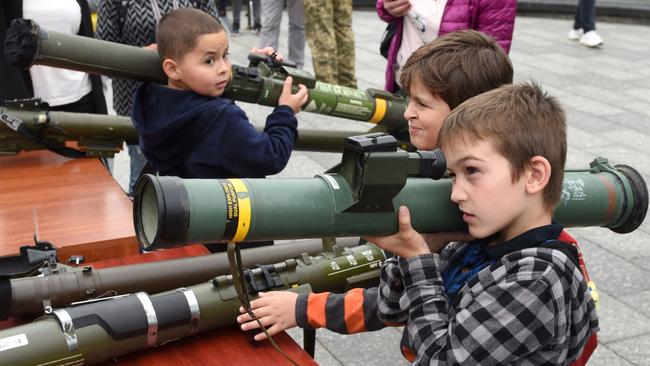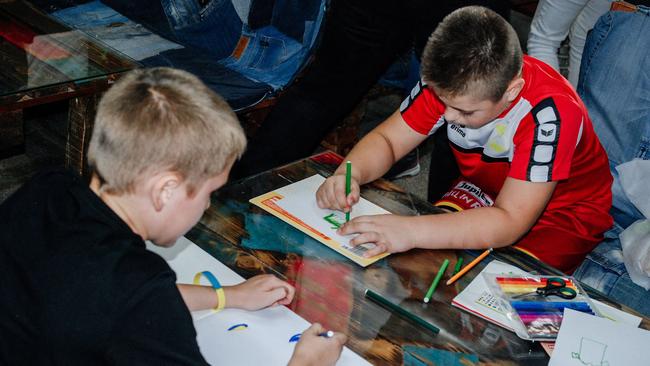Russians burning books, torturing teachers in Ukraine
The invaders are trying to stamp out underground schooling in occupied territory, Kyiv’s education minister says.

Russian soldiers are burning books and kidnapping and torturing teachers as they try to stamp out underground Ukrainian schooling in occupied territory, Ukraine’s education minister says.
A staged referendum on annexation to the Russian Federation is due to take place in occupied areas of the Zaporizhzhya and Kherson regions on September 11, but efforts are already under way to impose a Russian curriculum on children that erases any mention of their country’s history and identity.
“They are making arrests in Kherson region for teaching the Ukrainian school curriculum and burning Ukrainian books. It’s barbaric, in the 21st century,” said Education Minister Serhiy Shkarlet.
He said most Ukrainian teachers in areas controlled by the Kremlin’s forces had refused to go along with President Vladimir Putin’s curriculum for the new school year on September 1, triggering a wave of arrests and intimidation. “Russians take teachers, keep them for several days, torture them then release them. It’s savagery,” Mr Shkarlet said. “I’m proud that 97 per cent of our educators refused to give in and work for the occupier.”
As well as insisting on use of the Russian language, the Kremlin has introduced school books that gloss over key moments in Ukrainian history such as the 1930s famine known as the Holodomor, when Stalin’s collectivisation policies killed an estimated four million Ukrainians. They omit “Kyivan” from the name of the ancient state of Kyivan Rus, the predecessor to modern-day Ukraine and Russia, centred in Kyiv.
Kherson, on the Dnipro River, was the first big city captured in the invasion and the Russian-backed occupation government in southern Ukraine has been trying to force its agenda on teachers there since May.
It threatened to take some for “retraining” in Crimea, where children are made to learn patriotic anthems and parade in “Z” formations or Soviet-era costumes in displays of support for Mr Putin’s war. Russian media has called for teachers who resist to be shot or “sent to the gulag”.

Kherson residents have confirmed stories of arrests, threats and torture. They told The Times that Russian soldiers had also taken over some schools in the city as barracks, placing tripwires and explosives around them.
Some head teachers have opted to close their schools early and find alternative ways to communicate with pupils rather than bow to the Kremlin’s demands. Mr Shkarlet, 49, said they were using YouTube channels and even national television channels to broadcast the usual Ukrainian school lessons.
Teachers in Russian-held territory have taken great risks to stay in touch, sometimes crossing the frontlines and returning with information and salaries for their colleagues. Parent-teacher meetings have become hurried, furtive phone conversations.
Keenly aware of the impact that Covid lockdowns had already had on children’s education, the ministry sought to reopen schools across the country two weeks into the invasion — but millions of families were forced to flee when Russian shells rained down on Ukrainian cities.
“About 1180 schools were immediately on occupied territory. Every day we were losing at least one educational institution.
“Today, we have some 2500 educational institutions that are damaged or completely destroyed,” Mr Shkarlet said.
“Many of our school graduates were revising for university entrance exams under bombs, without light, without the internet, working exclusively from textbooks. Yet we have 7500 graduates who passed with the highest score.”
With 18 per cent of the country’s 13,800 schools in ruins, less than half of the 3.6 million schoolchildren will be able to return to class next month.
Online learning introduced for Covid lockdowns had helped to salvage pupils’ education over the past year, Mr Shkarlet said, and would need to be used again in the next.
About 630,000 Ukrainian refugee children are about to start a new school year abroad.
Kyiv desperately hopes this lost generation will one day return to help to rebuild the nation, meaning that continuing Ukrainian education abroad is vital.
The Times



To join the conversation, please log in. Don't have an account? Register
Join the conversation, you are commenting as Logout